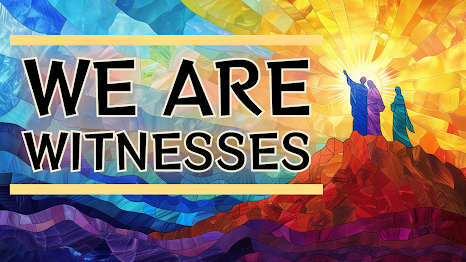We Are Witnesses - Week Two: "Why Are You Surprised?"
It’s Eastertide (Season of Easter)
We will study from the Book of Acts to learn more about those first witnesses of the Resurrection and what we can apply to our own time and place.
Today, we will be reading from the margins of the story we will explore in Acts. And this concept got me thinking this week about supporting characters in stories, particularly in films.
How The Supporting Cast Tells The Tale
What are some characters in a film that played a supporting role, but the story depended upon them?
Steve Buscemi - Big Lebowski
Robert Downey Jr. - Tropic Thunder
Cameron Diaz - My Best Friend's Wedding
Maggie Gyllenhall - The Dark Knight
Christopher Waltz - Django Unchained, Inglorious B****rds
There are countless examples, but we can also use literary references. Imagine Shakespeare's Othello without Iago and Julius Caesar without Brutus. Or Melville's Moby Dick without Capt. Ahab, Calvin without Hobbes...
Sometimes, it’s important to read Scripture from the margins. The people who play the supporting roles are often critical in our understanding of what is really happening in the story.
Plus, when we read from the margins, we become much more mindful of who is being excluded from the story and who is being pushed to those margins in some way.
Reading the Bible from the margins can change our perspective and help us dig deeper into meaning.
Today's character drives our story: a disabled man who was healed by Peter and John outside of the Temple.
6 Then Peter said, “Silver or gold I do not have, but what I do have I give you. In the name of Jesus Christ of Nazareth, walk.” 7 Taking him by the right hand, he helped him up, and instantly the man’s feet and ankles became strong. 8 He jumped to his feet and began to walk. Then he went with them into the temple courts, walking and jumping, and praising God.
Naturally, a guy almost everyone had seen daily begging outside the Temple because he could not walk, who was now jumping and praising, caused a stir.
Peter then addresses the crowd:
12 When Peter saw this, he said to them: “Fellow Israelites, why does this surprise you? Why do you stare at us as if by our own power or godliness we had made this man walk? 13 The God of Abraham, Isaac and Jacob, the God of our fathers, has glorified his servant Jesus. You handed him over to be killed, and you disowned him before Pilate, though he had decided to let him go. 14 You disowned the Holy and Righteous One and asked that a murderer be released to you. 15 You killed the author of life, but God raised him from the dead. We are witnesses of this. 16 By faith in the name of Jesus, this man whom you see and know was made strong. It is Jesus’ name and the faith that comes through him that has completely healed him, as you can all see.17 “Now, fellow Israelites, I know that you acted in ignorance, as did your leaders. 18 But this is how God fulfilled what he had foretold through all the prophets, saying that his Messiah would suffer. 19 Repent, then, and turn to God, so that your sins may be wiped out, that times of refreshing may come from the Lord,
Let us take care of Christ while there is still time; let us minister to Christ’s needs, let us give Christ nourishment, let us clothe Christ, let us gather Christ in, let us show Christ honor. . . . Let us give this gift to him through the needy, who today are cast down on the ground, so that when we all are released from this place, they may receive us into the eternal tabernacle, in Christ himself, who is our Lord.” (Oration 14, 39-40) - Gregory of Nazianzus
God feels the world in the way the disabled person feels the world. To call God disabled reminds us of the concreteness of God's loving presence in the world. - Burton Cooper "The Disabled God"




Comments
Post a Comment
Thanks for leaving a comment! If you comment Anonymously, your comment will summarily be deleted.